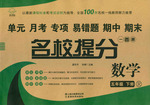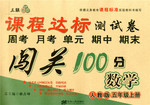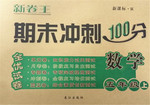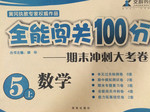
They began the r___ work at once, as soon as the earthquake happened..
 名校提分一卷通系列答案
名校提分一卷通系列答案 课程达标测试卷闯关100分系列答案
课程达标测试卷闯关100分系列答案 新卷王期末冲刺100分系列答案
新卷王期末冲刺100分系列答案 全能闯关100分系列答案
全能闯关100分系列答案科目:高中英语 来源:2009年普通高等学校招生全国统一考试江西卷英语试题 题型:完型填空
Peter and Paul had a permission from their parents to camp in a field close to their farm. But, being adventurous boys, they know it would be more 36 to camp in the woods that lay beyond the river. Excitedly, the boys 37 with their tent and food.
Carrying their heavy 38 , the two brothers walked along the riverbank, hardly noticing the distance or the sun beating down. . They were eager to reach their 39 before lunchtime. As they entered the cool, shadowy woods, they began to search for a suitable camping spot. Peter wanted to 40 close to the river at the edge of the woods, 41 Paul, who was older, insisted that they camp further away. 42 Peter followed his brother deeper into the 43 . “This really is a wonderful setting!” said Paul in excitement. They 44 the tent , and settled down to eat the sandwiches they had made, then decided to find their way 45 to the river to catch some fish.
“Are you sure that this is the right 46 ?” whispered Peter shakily. “I’m sure we passed that hollow tree just a while ago. ” Paul walked 47 silently. “Look, there it is again. We’re lost, aren’t we?” complained Peter. Paul had to admit that he didn’t know where they were. 48 , they were a long distance from where they were 49 to be. They were not even 50 of where they had set up their camp. They set in 51 for a few minutes until Peter had a bright idea. “Why don’t we look for clues(线索) the way trackers 52 in the movies? We weren’t careful about how we walked, so I’m sure we would have left 53 some broken tree branches and leaves. ”
Carefully, the boys 54 the marks that they had left, until finally they found their campsite. Hurriedly, they packed their belongings and set off 55 the direction of the river.
What would their parents think of their adventure?
36. A. surprising B. exciting C. annoying D. frightening
37. A. went round B. went back C. went away D. went though
38. A. load B. torn C. food D. storage
39. A. grassland B. destination C. field D. river
40. A. live B. lie C. wait D. stay
41. A. but B. and C. or D. so
42. A. Unconsciously B. Unfortunately C. Unwillingly D. Uninterestingly
43. A. woods B. farm C. setting D. camp
44. A. put off B. put on C. put down D. put up
45. A. forward B. near C. back D. further
46. A. place B. mark C. way D. time
47. A. alone B. about C. in D. on
48. A. After all B. At last C. Above all D. At first
49. A. discovered B. encouraged C. persuaded D. supposed
50. A. afraid B. sure C. informed D. reminded
51. A. enjoyment B. satisfaction C. disappointment D. imagination
52. A. appear B. do C. work D. behave
53. A. behind B. out C. aside D. amount
54. A. fetched B. watched C. followed D. collected
55. A. for B. to C. at D. in
查看答案和解析>>
科目:高中英语 来源:2012-2013学年宁夏育才中学高一下学期期中考试英语试卷(带解析) 题型:阅读理解
How Americans Began to Eat Tomatoes
People have strange ideas about food. For example, the tomato is a kind of very
delicious vegetable. It is one of useful plants that can be prepared in many ways. It has rich nutrition and vitamin in it. But in the 18th century, Americans never ate tomatoes. They grow them in their gardens because tomato plants are so pretty. But they thought the vegetable was poisonous (有毒的). They called tomatoes “poison apples”.
President Thomas Jefferson, however, knew that tomatoes were good to eat. He was a learned man. He had been to Paris, where he learned to love the taste of tomatoes. He grew many kinds of tomatoes in his garden. The President taught his cook a way for a cream of tomato soup. This beautiful pink soup was served at the President’s party. The guests thought the soup tasted really good. They never thought their president would serve his honored guests poison apples. Jefferson never spoke to his honored (尊贵的) guests about the fact.
【小题1】After you read the passage, which of the following do you think is true?
| A.Americans never ate tomatoes after they began to plant them. |
| B.American didn’t eat tomatoes before the 19th century. |
| C.Even now Americans don’t eat tomatoes |
| D.In the 18th century Americans ate a lot of tomatoes. |
| A.while he was in Paris . |
| B.when he was a little boy. |
| C.the President ’s cook. |
| D.the President’s wife. |
| A.the President himself. |
| B.A French cook |
| C.the President ’s cook |
| D.the President’s wife |
| A.厨房 | B.厨师 | C.厨具 | D.做饭 |
| A.people from other countries | B.from France |
| C.People of his own country | D.men only |
查看答案和解析>>
科目:高中英语 来源:2010年浙江省金华一中高一(中加班)上学期期中考试英语卷 题型:阅读理解
On November 19, 1863, Abraham Lincoln went to Gettysburg to speak at the National Soldiers Cemetery(公墓). The Civil War was still going on. There was much criticism (批评) of President Lincoln at the time. He had been invited to speak at Gettysburg only out of politeness. The other speaker was to be Edward Everett, a famous statesman (政治家) and speaker of the day. Everett was a handsome man and very popular everywhere.
It is said that Lincoln prepared his speech on the train while going to Gettysburg. Later that night, alone in his hotel room and tired out, he again worked briefly on the speech. The next day Everett spoke first. His speech lasted an hour and 57 minutes and it was a perfect example of the day. Then Lincoln rose. The crowd of 15,000 people at first paid little attention to him. He spoke for only nine minutes. At the end there was little applause(掌声). Lincoln turned to a friend and said, “I have failed again.”
Some newspapers at first criticized (批评) the speech. But little by little, as people read the speech, they began to like its simplicity(简洁)and its deep meaning. It was a speech which only Abraham Lincoln could have made.
Now everyone thinks of it as one of the greatest speeches ever given in American history.
【小题1】 In 1863, Abraham Lincoln was __________________ in Gettysburg.
| A.warmly welcomed | B.unpopular | C.greatly praised | D.very polite |
| A.a famous speaker of the day | B.very handsome and polite |
| C.President of the United States at the time | D.a popular statesman |
| A.Lincoln had prepared his speech very carefully before he went to Gettysburg |
| B.Lincoln was very busy at the time and didn’t have much time to prepare his speech |
| C.Lincoln’s speech seemed to be a failure for the first time |
| D.Lincoln’s speech was a little shorter than Everett’s one |
| A.an immediate success | B.not accepted at all |
| C.a total failure | D.not well-received at first |
| A.Lincoln’s speech has deep meaning though it is simple in style. |
| B.Neither Lincoln’s speech nor Everett’s was popular then. |
| C.Lincoln’s speech proved to be a great success later. |
| D.Everett’s speech was thought to be perfect at that time. |
查看答案和解析>>
科目:高中英语 来源:2012届甘肃省甘谷一中高三第二次检测英语试卷(带解析) 题型:阅读理解
A year after graduation, I was offered a position teaching a writing class. Teaching was a profession I had never seriously considered, though several of my stories had been published. I accepted the job without hesitation, as it would allow me to wear a tie and go by the name of Mr. Davis. My father went by the same name, and I liked to imagine people getting the two of us confused. “Wait a minute,” someone might say, “are you talking about Mr. Davis the retired man, or Mr. Davis the respectable scholar?”
The position was offered at the last minute, and I was given two weeks to prepare, a period I spent searching for briefcase (公文包) and standing before my full-length mirror, repeating the words, “Hello, class. I’m Mr. Davis.” Sometimes I would give myself an aggressive voice. Sometimes I would sound experienced. But when the day eventually came, my nerves kicked in and the true Mr. Davis was there. I sounded not like a thoughtful professor, but rather a 12-year-old boy.
I arrived in the classroom with paper cards designed in the shape of maple leaves. I had cut them myself out of orange construction paper. I saw nine students along a long table. I handed out the cards, and the students wrote down their names and fastened them to their breast pockets as I required.
“All right then,” I said. “Okay, here we go.” Then I opened my briefcase and realized that I had never thought beyond this moment. I had been thinking that the students would be the first to talk, offering their thoughts and opinions on the events of the day. I had imagined that I would sit at the edge of the desk, overlooking a forests of hands. Every student would yell. “Calm down, you’ll all get your turn. One at a time, one at a time!”
A terrible silence ruled the room, and seeing no other opinions, I inspected the students to pull out their notebooks and write a brief essay related to the theme of deep disappointment.
【小题1】The author took the job to teach writing because ______.
| A.he wanted to be expected |
| B.he had written some storied |
| C.he wanted to please his father |
| D.he had dreamed of being a teacher |
| A.He would be aggressive in his first class. |
| B.He was well-prepared for his first class. |
| C.He got nervous upon the arrival of his first class. |
| D.He waited long for the arrival of his first class. |
| A.write down their suggestions on the paper cards |
| B.cut maple leaves out of the construction paper |
| C.cut some cards out of the construction paper |
| D.write down their names on the paper cards |
| A.They began to talk. | B.They stayed silent. |
| C.They raised their hands. | D.They shouted to be heard. |
| A.he got disappointed with his first class |
| B.he had prepared the topic before class |
| C.he wanted to calm down the students |
| D.he thought it was an easy topic |
查看答案和解析>>
科目:高中英语 来源:2012-2013学年浙江省衢州一中高一下学期期中检测英语试卷(带解析) 题型:阅读理解
Many people watched the lift-off of the space shuttle Columbia on March 21, 1982. But none watched more closely than eighteen-year-old Ted, as Ted’s insects were on board the shuttle.
The Shuttle Student Involvement Program invited students to make a science experiment. The experiment would be done by astronauts on the space shuttle.
Ted had always been interested in space and flight. Insect flight especially interested him. Ted noticed that insects need gravity to take off and land. They need gravity to fly in a straight line. But in space, there is no gravity. Could insects fly in zero gravity? That is what Ted wanted to find out.
Ted made an experiment called “Insect in Flight Motion Study”. He entered his experiment and soon news came that it was a winner.
A large team of scientists and engineers helped Ted get his experiment ready to fly. There were many questions to be answered first. What kind of insects would Ted use in his experiment? The insects would have to be strong enough to live on the shuttle for nine days without much food. What kind of container would hold the insects? Would the insects die during the shuttle flight?
After months of hard work, the “insectronauts” were chosen. A group of moths, flies, and honeybees were put into a special box and put onto the space shuttle. When Columbia flew into space, it was carrying insect passengers.
On March 24, astronauts Gordon Fullerton and Jack Lousma took out the box that held the insects. They began filming the insects with a special video camera.
When the space shuttle landed Ted was able to watch the video film of insects. Just as he thought, most of the insects did have trouble flying in zero gravity. The flies did well. But the moths’ flight seemed “uncontrolled”. They would often just hang in the air. The bees had the most trouble. They couldn’t fly at all! The film showed bees spinning around in all directions. Others were just floating about in the box.
Ted learned the answer to his question about insects’ flight in zero gravity. But he also learned a lot more. He learned about the hard work needed in making a successful experiment.
【小题1】What does the underlined sentence “it was a winner” mean?
| A.Ted could fly in space. | B.Ted won a prize. |
| C.Ted’s experiment was accepted. | D.Ted won in a race. |
| A.Whether the insects could fly in space. |
| B.Whether the insects could fly in a straight line. |
| C.Whether the insects could land after flying for a while. |
| D.Whether the insects could take off after resting for a while. |
| A.The flies. | B.The honeybees. | C.The insects. | D.The moths. |
| A.Ted himself. |
| B.Ted’s friend. |
| C.A large team of scientists and engineers. |
| D.Two astronauts on the space shuttle. |
| A.By asking the scientists and engineers. |
| B.By studying a book written by the astronauts. |
| C.By going into space and watching the insects’ flight himself. |
| D.By watching the video film made by the astronauts. |
查看答案和解析>>
湖北省互联网违法和不良信息举报平台 | 网上有害信息举报专区 | 电信诈骗举报专区 | 涉历史虚无主义有害信息举报专区 | 涉企侵权举报专区
违法和不良信息举报电话:027-86699610 举报邮箱:58377363@163.com